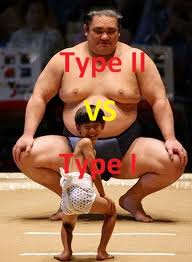 Search
Search
 Search
Search
 Type 1 and type 2 diabetes are the two major categories of diabetes. Type 1 diabetes is an autoimmune disease in which the immune system will attack and kill the pancreatic beta cells. As a result, the pancreas can not secrete enough insulin and patients have to rely on exogenous insulin to maintain normal life that is why it is called insulin dependent diabetes. Type 2 diabetes is non-insulin-dependent diabetes mellitus. The patients do not lose the ability of producing insulin completely, only that the effects are much weakened and this is a relative insufficiency of insulin.
Type 1 and type 2 diabetes are the two major categories of diabetes. Type 1 diabetes is an autoimmune disease in which the immune system will attack and kill the pancreatic beta cells. As a result, the pancreas can not secrete enough insulin and patients have to rely on exogenous insulin to maintain normal life that is why it is called insulin dependent diabetes. Type 2 diabetes is non-insulin-dependent diabetes mellitus. The patients do not lose the ability of producing insulin completely, only that the effects are much weakened and this is a relative insufficiency of insulin.
There are many differences between these two types of diabetes.
1. Age of onset. Type 1 diabetes usually occurs to people that are below 40 and the children and adolescents are mostly type 1 and there is only a few exception. Type 2 diabetes usually occurs to people above 40. It is very rare that people over 50 will develop type 1 diabetes.
2. Weight. Those that are obese are mostly type 2 and the more obese the more likely to develop type 2 diabetes. Type 1 patients usually have normal or low weight before the onset of the disease.
3. Symptoms. Type 1 diabetes has obvious clinical symptoms such as polydipsia, diuresis, over-eating while type 2 usually has no such typical symptoms. Therefore they often do not know when did they develop the disease and it is often found out after checking blood sugar.
4. Complications. Type 1 is easy to have ketoacidosis, fundus retinal disease, kidney disease and neuropathy. It is rare that type 2 will have ketoacidosis, but the elder patients are susceptible to hypertonic coma. As for the chronic complications, type 2 have higher incidence of vascular atherosclerosis in the heart, brain and kidneys than type 1. This is a significant difference between type 1 and type 2 diabetes.
5. Treatments. For type 1 diabetes the blood sugar can only be brought under control by insulin injection and oral intake of hypoglycemic medicines usually has no effects. For type 2, reasonable diet and proper intake of hypoglycemic medicines can help bring the blood sugar well under control. Of cause, when the hypoglycemic medicines fail and when Islet B cell is severely damaged or there are serious complications, insulin can be adopted.